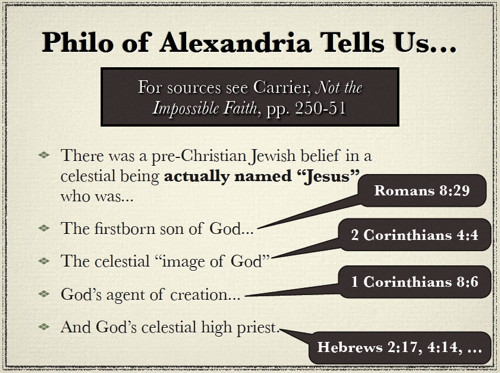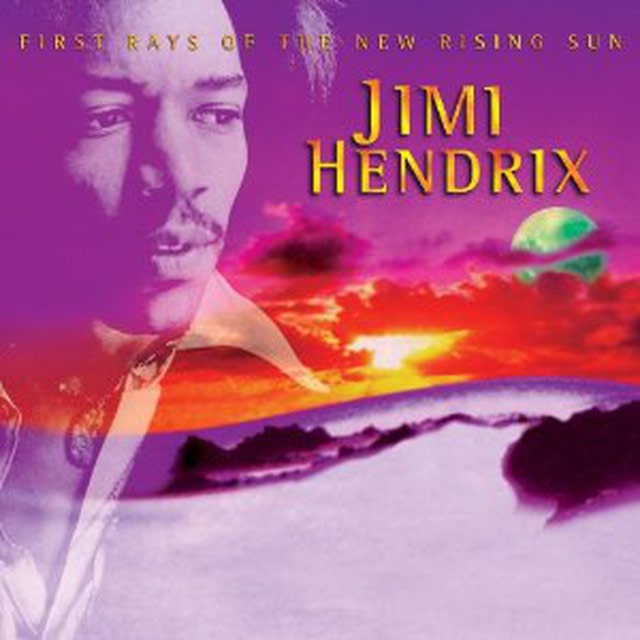
 |
Freethought & Rationalism ArchiveThe archives are read only. |
|
|
#21 |
|
Banned
Join Date: Sep 2011
Location: middle east
Posts: 829
|
Wow.
What a terrific post, (Carrier's blog). Thank you very much Toto. Carrier has really written an elegant summary. Required reading for every member of this forum.... Thanks again, marvelous writing. I would love to read some rejoinders, attempting to refute his points.....I see a possible opening in his reference to LXX, versus the authentic text of the time, i.e. from DSS. Otherwise, looks very well researched, earnest, focused, properly terse, but with adequate references. If this were a stock, I would purchase shares of it. 
|
|
|
|
|
#22 | ||
|
Banned
Join Date: Sep 2011
Location: middle east
Posts: 829
|
I am not revising downward my lofty impression of Carrier's remarks, but, I would add to the comment above, that, in my opinion, part of the controversy at the Goodacre blog is due to LXX text differing from the original Hebrew (dss). So, I really cannot adquately judge this, but the forum has a dozen or more members who are literate in both Hebrew and Greek, and I hope one or more of them will comment on this point.
Here is the issue, from the link provided above by Toto, at Goodacre's blog: Quote:
Quote:
11Accept their gifts, and make a crown from the silver and gold. Then put the crown on the head of Jeshua son of Jehozadak, the high priest. 12Tell him, ‘This is what the Lord of Heaven’s Armies says: Here is the man called the Branch. He will branch out from where he is and build the Temple of the Lord. How is that different from the "original" text? Here is Hebrew of 6:12: ואמרת אליו לאמר כה אמר יהוה צבאות לאמר הנה־איש צמח שמו ומתחתיו יצמח ובנה את־היכל יהוה׃ 6:12 V'aMUrTh 'aLYV L'aMUr KH 'aMUr YHVH TShB'aVTh L'aMUr HNH-'aYSh TShMCh ShMV VMThChThYV YTShMCh VBNH 'aTh-HYKL YHVH. Latin Vulgate 6:12 et loqueris ad eum dicens haec ait Dominus exercituum dicens ecce vir Oriens nomen eius et subter eum orietur et aedificabit templum Domino King James Version 6:12 And speak unto him, saying, Thus speaketh the LORD of hosts, saying, Behold the man whose name is The BRANCH; and he shall grow up out of his place, and he shall build the temple of the LORD: American Standard Version 6:12 and speak unto him, saying, Thus speaketh Jehovah of hosts, saying, Behold, the man whose name is the Branch: and he shall grow up out of his place; and he shall build the temple of Jehovah; Bible in Basic English 6:12 And say to him, These are the words of the Lord of armies: See, the man whose name is the Branch, under whom there will be fertile growth. Darby's English Translation 6:12 and speak unto him, saying, Thus speaketh Jehovah of hosts, saying, Behold a man whose name is the Branch; and he shall grow up from his own place, and he shall build the temple of Jehovah: Douay Rheims Bible 6:12 And thou shalt speak to him, saying: Thus saith the Lord of hosts, saying: BEHOLD A MAN, THE ORIENT IS HIS NAME: and under him shall he spring up, and shall build a temple to the Lord. Noah Webster Bible 6:12 And speak to him, saying, Thus speaketh the LORD of hosts, saying, Behold the man whose name is The BRANCH; and he shall grow up out of his place, and he shall build the temple of the LORD; World English Bible 6:12 and speak to him, saying, Thus speaks Yahweh of Hosts, saying, Behold, the man whose name is the Branch: and he shall grow up out of his place; and he shall build the temple of Yahweh; Do we know for certain, that Philo's version of LXX conforms to our extant version of LXX, or, did it more closely resemble the original Hebrew text, as found in DSS? We ought not quibble about what Philo meant, in writing this or that, if we do not understand with complete assurance, which version of the text, he employed..... 
|
||
|
|
|
|
#23 | |||
|
Veteran Member
Join Date: Sep 2004
Location: Birmingham UK
Posts: 4,876
|
Quote:
Andrew Criddle |
|||
|
|
|
|
#24 |
|
Veteran Member
Join Date: Jun 2010
Location: seattle, wa
Posts: 9,337
|
Tsemach also implies someone very young. Branch is a mistranslation. It means bud or something small like eye of a potato
|
|
|
|
|
#25 |
|
Senior Member
Join Date: Jul 2003
Location: Alberta, Canada
Posts: 927
|
Carrier said: “We do have a reference to a pre-existent being named Jesus who was the first born son of God, who was the high priest of the celestial temple, just like Hebrews explains, and was also called the logos, the word of God, and this is in Philo… Philo refers to this deity several times, this - deity's perhaps the wrong word, he's an archangel in Philo's vocabulary - who’s named Jesus.”
Philo, Confusion of tongues, XIV 62-63 "I have also heard of one of the companions of Moses having uttered such a speech as this: "Behold, a man whose name is the East!" A very novel appellation indeed, if you consider it as spoken of a man who is compounded of body and soul; but if you look upon it as applied to that incorporeal being who in no respect differs from the divine image, you will then agree that the name of the east has been given to him with great felicity. For the Father of the universe has caused him to spring up as the eldest son, whom, in another passage, he calls the firstborn; and he who is thus born, imitating the ways of his father, has formed such and such species, looking to his archetypal patterns." LXX Zechariah 6:11-12 "'Then, take the silver and gold to make a crown, and place it on JoShua's head (the son of JoZadek, the High Priest). And tell him that thus says Jehovah: {Look!} There's a male whose name is The Sprout, and he will grow from below, to rebuild the House of Jehovah." How could Zechariah be considered a companion of Moses, who allegedly lived almost a millenium before the prophet? And there is a lot of difference between "Behold, a man whose name is the East! ... to spring up" (Philo) and "There's a male whose name is The Sprout, and he will grow from below" (Zechariah) despite some similarities. So I am not buying Philo was referring to Zechariah 6. Furthermore Philo did not say he read the story, but he heard about it, probably referring to some oral "tradition", not biblical written texts. And I do not see any connection between that would-be new king Joshua/Jesus, the son of JoZadek, the High Priest and Philo's firstborn. Cordially, Bernard |
|
|
|
|
#26 |
|
Contributor
Join Date: Jun 2000
Location: Los Angeles area
Posts: 40,549
|
From Carrier's blog:

|
|
|
|
|
#27 | |
|
Contributor
Join Date: Jun 2000
Location: Los Angeles area
Posts: 40,549
|
Not the Impossible Faith p. 250-1
Quote:
|
|
|
|
|
|
#28 | |
|
Contributor
Join Date: Feb 2006
Location: the fringe of the caribbean
Posts: 18,988
|
Philo wrote NOTHING at all about a Jesus who died for our sins--NOTHING.
There is NO heavenly sacrificied being named Jesus in the writings of Philo--NOTHING--ZERO. Again, the Pauline writer did NOT even claim he started the Christian Faith. The Pauline writer was a Persecutor and WASTED the Church. Galatians 1:13 KJV Quote:
The Pauline writer merely claimed that he was the Last to be seen of the resurrected Jesus and received revelations from him. It must be obvious that the Jesus story and cult PREDATED the Pauline writer and that it was already known and written in Scripture that Jesus died for our sins, was buried and resurrected on the third day. |
|
|
|
|
|
#29 | |
|
Veteran Member
Join Date: Jun 2010
Location: seattle, wa
Posts: 9,337
|
I'm not so sure Carrier is right about this:
Quote:
|
|
|
|
|
|
#30 |
|
Veteran Member
Join Date: Jun 2010
Location: seattle, wa
Posts: 9,337
|
Aanatolê means the newly risen sun, or otherwise the first appearance of anything at all. It can mean the time or point of rising of a constellation over the horizon; the Ascendant (as an astrological term); the first half of the morning; teeth coming through; the first sprouting of new grass above ground; the first appearance of a river above ground. The nearest I can get to an English equivalent for it in this passage is the upwelling or the first shining.
Yes, it does mean the Logos. Proverbs 8:22: The Lord acquired me (or brought me into existence, wrought me) as the first (or at the start of, reshit) his ways (not “his act of creation”). But again anatolê = tsemach. There is no meaningful difference between the LXX and the Hebrew. Tsade-Mem-Ḥet does not mean a branch; it means a new shoot. There are two meanings of the root in Hebrew and in Aramaic. In Hebrew and Palestinian Aramaic it means to sprout, except here in Hebrew. In Syriac it means shining, but occasionally means sprouting or a sprout. Both anatolê and tsemach can both mean the first appearance of the sun, and a suitable English equivalent in this verse would be “the newly-risen sun”.  I don't see how Carrier can identify either Jesus Christ or Jesus the high priest with the figure of the anatolê/tsemach. He is the king, not the high priest. Morton Smith was a historian like Carrier but also had a good foundation in ancient languages. Carrier's argument unfortunately demonstrates he has an insufficient grasp of the Hebrew (and the Greek). The figure of the anatolê/tsemach is the one who sits beside Jesus. |
|
|
| Thread Tools | Search this Thread |
|